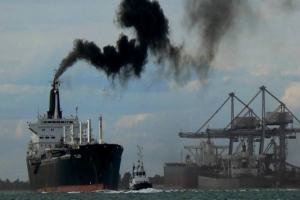


(Posted on 26/02/19)
The Clean Shipping Alliance 2020 has expressed strong concerns about a proposal submitted by the European Commission (EC) which urges the International Maritime Organization (IMO) to change its Exhaust Gas Cleaning System (“scrubber”) guidelines.
The proposal, which the Commission submitted to IMO on the 8 February deadline, calls for “evaluation and harmonization” of scrubber discharges across all ports, world-wide. The proposal is intended for consideration by the 74th session of the IMO’s Marine Environment Protection Committee (MEPC 74) which meets in May, in London.
“This proposal is an attempt by the European Commission to push forward restrictions on scrubbers, which are accepted globally by the IMO, EU and others as acceptable means of improving air emissions quality in controlled areas” said CSA 2020 Executive Director Ian Adams.
“Within two weeks of a draft surfacing, the Commission had taken the proposal to a one-day Working Party review and then submitted it to IMO” he said. “Clearly this was planned to avoid the open discussion and deliberation that a proposal with such far-reaching impact requires. In the absence of credible evidence to justify such a major departure from the existing rules, the proposal is instead based mostly on speculation.
“CSA 2020 members, who represent over 30 leading commercial and passenger shipping companies have been investing for years to prepare their ships in time to meet emissions abatement targets in accordance with existing IMO and EU rules, which endorse the use of open and closed-loop scrubbers in all waters,” said Adams. “To see the Commission take this step within months of the entry-into-force of the Global ECA is beyond disappointing.”
Noting the broader issues facing the industry, Adams added: “The EC initiative is needlessly creating baseless concerns at a time when there are already very real issues in the maritime industry regarding the future availability, suitability and cost of fuels and the effects on global trade and shipping that this will have. There could also be safety implications should ships be required to change fuels in high traffic areas close to ports.
“I am sure Brussels is very aware that existing scientific data shows significant air emissions improvement from scrubbers, with no likely impact on the ocean environment, but it appears the submission to IMO was prepared with speed rather than accuracy.”
In a letter to its membership seen by CSA 2020, a European national shipowners’ association says: “The EC submission does not identify any scientific evidence of potential risks but is lost in assumptions and speculation about possible contaminant levels and claimed risk potentials.”
In its proposal, the Commission refers to the interim result of a study to be completed in May 2019 by the Federal Maritime and Hydrographic Agency (BSH) for the investigation of scrubber wash water from closed loop and open loop systems. But as the preliminary conclusions of the BSH study do not appear to align with the Commission’s proposal, it is far from clear whether it will contain any suggestion of new restrictions on scrubber wash water.
CSA 2020 will be hosting a technical conference on the 21st February, in London, where scientific data relating to scrubber air emissions and wash water quality will be presented.
CSA 2020 represents a group of leading companies from the commercial shipping and passenger ship industries that have been leaders in emission control efforts through significant investments in research and analysis, funding and committing resources to comply with 2020 fuel requirements through the development and use of Exhaust Gas Cleaning Systems (EGCS).
The Alliance was formed on 27th September 2018 with a mission to provide information and research data to better inform industry and the wider public. In addition to serving as an advocate for companies working to reduce marine exhaust gas emissions, CSA 2020 will support the scheduled implementation and effective enforcement of the International Maritime Organization’s (IMO) requirement for a 0.5 percent global sulphur cap on fuel content as of 1 January, 2020.
Inchcape Shipping Services (ISS), a global leader in port agency and marine services, has announced... Read more
NORDEN have confirm that they have sold two vessels from their owned fleet, one Capesize vessel and... Read more
Pacific Basin Shipping Limited, one of the world’s leading dry bulk shipping companies, has entered... Read more
AtoB@C Shipping, a subsidiary of ESL Shipping, has announced the successful delivery of Fleximar, the... Read more
Western Bulk, together with reputable Norwegian partners A/S J. Ludwig Mowinckels Rederi, Premium Maritime... Read more
Pacific Basin Shipping Limited, one of the world’s leading dry bulk shipping companies, has announced... Read more
Columbia Group anticipates a period of strong expansion as an increasing number of international shipowners... Read more
Norse?Ship Management has expanded its use of Smart Ship Hub’s high frequency sensor data and... Read more
As the maritime industry gears up to welcome the IMO’s STCW bullying and harassment training amendments... Read more
NORDEN has acquired the cargo activities of Taylor Maritime in Southern Africa (previously operated... Read more